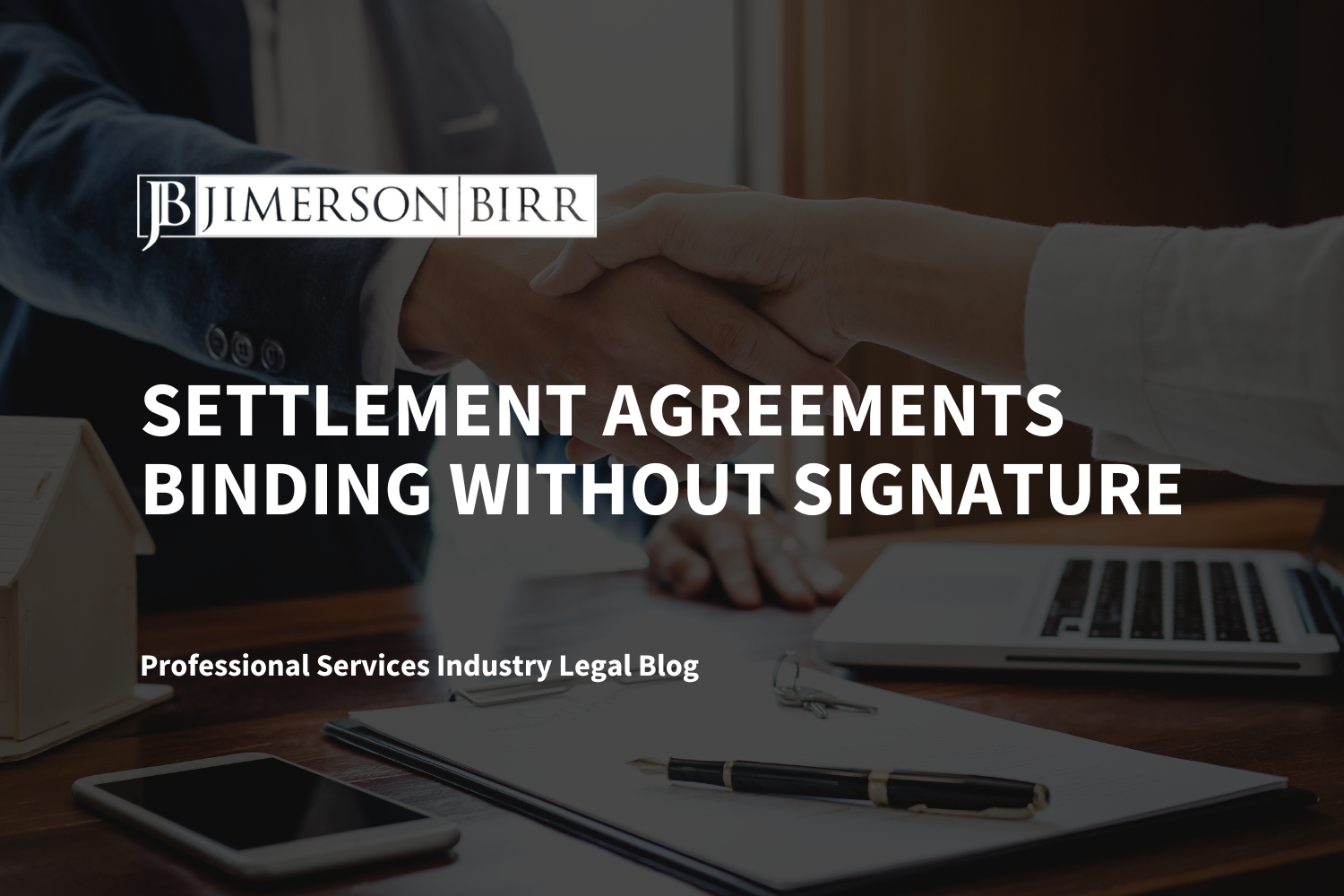The ultimate test of a binding settlement agreement is whether the parties to the agreement have a “meeting of the minds,” which is a mutual understanding of the essential terms of the agreement. At least one court in Florida has now ruled emails between attorneys can constitute an enforceable settlement agreement if the parties’ counsel had clear and unequivocal authority from the client to settle the case and correspondence between the parties’ attorneys showed that no essential terms of the agreement remained open or subject to future negotiation—even if one of the parties failed to sign the actual drafted agreement.
Meeting of the Minds
Settlement agreements are reviewed under the principles of contract law, are favored by the law, and will be enforced whenever possible. The basic elements of an enforceable contract are offer, acceptance, consideration, and specific essential terms. Jericho All-Weather Opportunity Fund, LP v. Pier Seventeen Marina & Yacht Club, LLC, 207 So. 3d 938, 941 (Fla. 4th DCA 2016). The party seeking to enforce a purported agreement has the burden of establishing agreement to the essential terms by the other party. “The definition of ‘essential term’ varies widely according to the nature and complexity of each transaction and is evaluated on a case-by-case basis.” Lanza v. Damian Carpentry, Inc., 6 So. 3d 674, 676 (Fla. 1st DCA 2009).
When determining whether there has been a meeting of the minds on all essential terms, courts often distinguish preliminary negotiations from a final agreement. Preliminary negotiations or tentative and incomplete agreements will not establish a sufficient meeting of the minds to create an enforceable agreement. Additionally, an agreement will not be found to be final if evidence shows it is the intent of the parties that further action be taken prior to the completion of a binding agreement—i.e., the execution of a written agreement. These safeguards ensure parties and their legal counsel can negotiate without fear of unintentionally entering into a binding agreement. Triton Stone Holdings, L.L.C. v. Magna Bus., L.L.C., 308 So. 3d 1002, 1006–07 (Fla. 4th DCA 2020).
Essentially, to be enforceable, an agreement must be sufficiently specific, and reflect agreement by the parties as to all of the essential terms. If any essential terms of an agreement remain open or subject to future negotiation, there is no meeting of the minds and thus no enforceable contract.
Competent, Substantial Evidence Required
Issues of contract interpretation from a factual standpoint and a trial court’s finding that there was a meeting of the minds must be supported by competent substantial evidence. Therefore, the issue of whether there was mutual assent to essential terms must also be supported by competent, substantial evidence. The party seeking to enforce a settlement agreement bears the burden of showing that the attorney proposing the settlement had the “clear and unequivocal authority from his client to do so.” Hamilton v. Fla. Power & LightCo., 48 So. 3d 170, 171-72 (Fla. 4th DCA 2010).
When Communications Show No Essential Terms Left to Negotiate
The mere fact that a party has not signed a settlement agreement is not dispositive as to whether an agreement existed. Several Florida Courts have stated that a settlement agreement does not have to be in writing and does not need to be signed to be enforceable. Furthermore, it has been found that the execution of settlement documents is not a necessary condition precedent to the settlement agreement, but rather “a mere procedural formality which both parties to the settlement agreement were obliged to perform.” Boyko v. Ilardi, 613 So. 2d 103, 104 (Fla. 3d DCA 1993).
Recent case law in Florida has found that emails between attorneys can constitute an enforceable settlement agreement where competent substantial evidence supports finding the parties agreed to all essential terms and that those terms were incorporated into a final settlement agreement. Where it is clear that correspondence between the parties’ attorneys show the following, a settlement agreement will likely be enforceable: (1) legal counsel was authorized to settle the matter for specific consideration; (2) drafted settlement agreements were exchanged between counsel; and (3) counsel accepted any revisions made by their counterpart and forwarded the final version back to the other party’s counsel. This type of exchange evidences no further essential terms are subject to future negotiation, thus resulting in an agreed-upon settlement—regardless of one party’s failure to then agree to sign the agreement.
Conclusion
Negotiating settlement agreements is an artful endeavor and requires specific language from counsel both during the negotiation process and when attempting to finalize any agreement. It’s crucial that during this process, parties are represented by legal counsel that properly represent their clients’ intent and do not bind them to any agreement unintentionally, while at the same time, ensure their opponent cannot refuse to sign of a legally enforceable agreement once all essential terms are agreed upon. The litigation attorneys at Jimerson Birr are well adept to assist you in both the negotiation process, and if necessary, the enforcement process during for any settlement. We are happy to assist you in navigating this artful process to ensure your rights are protected and your goals are achieved.

